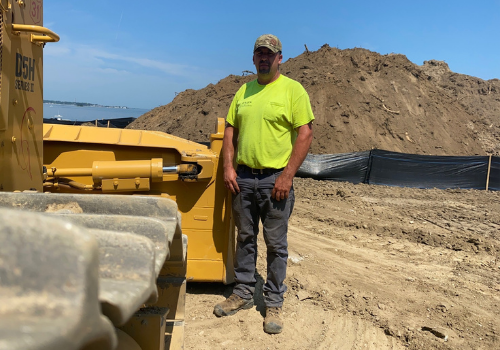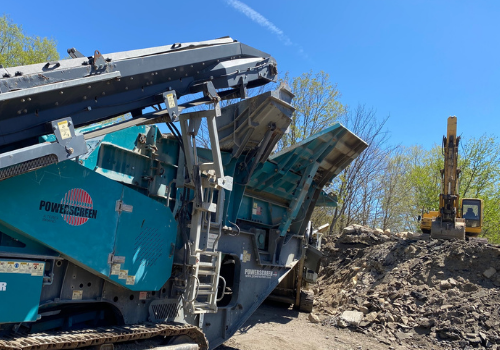“We all have families to feed.” That statement from Jon Kokinchak, operations manager at Datin Brothers Inc., reflects the unwritten motto of the company: “Act responsibly.” The statement itself relates to how Datin Brothers have handled Covid. There was a slowdown starting in 2020, a slowdown that has yet to fully relent in 2021. “Before the pandemic we had 15 or 16 employees,” says Kokinchak. “We now have 9, including me and the two Datin brothers. We’re doing all we can to ensure our remaining employees are cared for while we wait for a return to our normal volume of business.”
Datin Brothers have stopped most overtime and Saturday hours to conserve payroll dollars and reduce the likelihood of further layoffs. They also call on casual workers to meet periodic peaks in demand. These are retired operators who winter in Florida but still have homes in and near the four-county area of New York and Connecticut that form Datin Brothers’ market. “These are highly-skilled operators who have no interest in full-time work but are eager to work a few days here and there,” says Kokinchak. These occasional workers help with work flow but also allow Datin Brothers to not hire additional employees, “who would likely have to be laid off again.”
While Datin Brothers use outside help, they don’t use outside equipment. “We rarely rent anything,” says Kokinchak. “If we need something, we go out and get it.” That’s not say they’re frivolous in their acquisitions. “We have to see a real need.” As a result, Datin Brothers have the machines they need and most pieces of equipment see high utilization rates.
Their oldest machine is a 1984 dozer. It will be the first to be replaced and when the new dozer is ordered, and it will likely have 3D machine control. Overall, Datin Brothers’ use of technology is best described as limited. “I know GPS and machine control are big in other parts of the country, especially out west,” says Kokinchak. “But it’s been slower to gain traction here.” They use a GPS rover for layout and have a laser and Level Best grading box for use on a compact track loader, but that’s about it.
 Then and Now
Then and Now
Kokinchak started with Datin Brothers as a laborer in 2006. He came from a background that suited him well to the company’s operations. “I’ve always been a dirt guy.”
Tim and Mike Datin started the company in 1978. The young brothers were ages 24 and 20, respectively. They’re still brothers, of course, but no longer young and as often happens as owners age they’ve become more conservative in the management of the company.
As young go-getters, they expanded from doing just landscaping to also doing general excavating in their first two years of business. These days they stay with what they know, which includes general excavating, drainage, septic system and utility installation, demolition and rock crushing. They find ways to integrate these services. “Demolition can provide material we send to our crushers and then use as stable backfill on our excavation jobs,” says Kokinchak. Much of their work is for high-end residential, homes of 14,000 to 15,00 square feet.
The Datin brothers have divided company responsibilities along the line of their individual preferences and skills. Tim handles crushing and demolition. Mike does estimating, runs smaller jobs and handles general management. Kokinchak is the hands-on manager and is involved in everything.
 Navigating Challenging Times
Navigating Challenging Times
Covid has not been the first challenge the company has endured. Prior to Covid the most recent big upset was the 2008 financial crisis. Some of the strategies employed then remain in place now: “Keep it tight and take care of your customers, your equipment and your employees.”
But things are different coming out of Covid. “I would caution other contractors to not assume that a slight uptick in business is a sign of a continuing, sustainable recovery. We’ve gotten a couple of very good jobs recently, but uncertainty remains,” says Kokinchak.
Materials pricing and availability are part of that uncertainty. “Our supplier will guarantee pricing on PVC pipe for only 48 hours. Who knows what it will be in eight months or a year?” The choice is to buy pipe now and store it until it’s put in place or wait until nearer the time of placement and hope availability and pricing are manageable at that time. They can’t bill for the pipe until it’s placed so buying now means having resources tied up in an illiquid asset, sometimes for months, before they get paid. Waiting puts the whole job at risk if materials shortages persist or worsen or prices escalate in the intervening months. The length of their projects compounds the problem. From demolition and site prep to drainage and finish grading can take up to a year and a half. “It’s a tricky time for business and requires careful planning.”
Planning extends to equipment management. “Everything we have is paid for. We don’t like to have too much on the books.” Some pieces don’t get used much, but that’s okay. “We have access to that machine when we need it for just the cost of preventive maintenance and a slight additional drop in residual value.”
Kokinchak’s last piece of advice? “What we have works for us. We know our market. We know our corporate values and philosophy. We know how to apply this knowledge to remain successful no matter what challenges we face. I would advise others to formulate their business plans from that same basis of understanding.”
Join more than 50,000 industry peers who receive construction industry news and trends each week. Subscribe to CONEXPO-CON/AGG 365.








